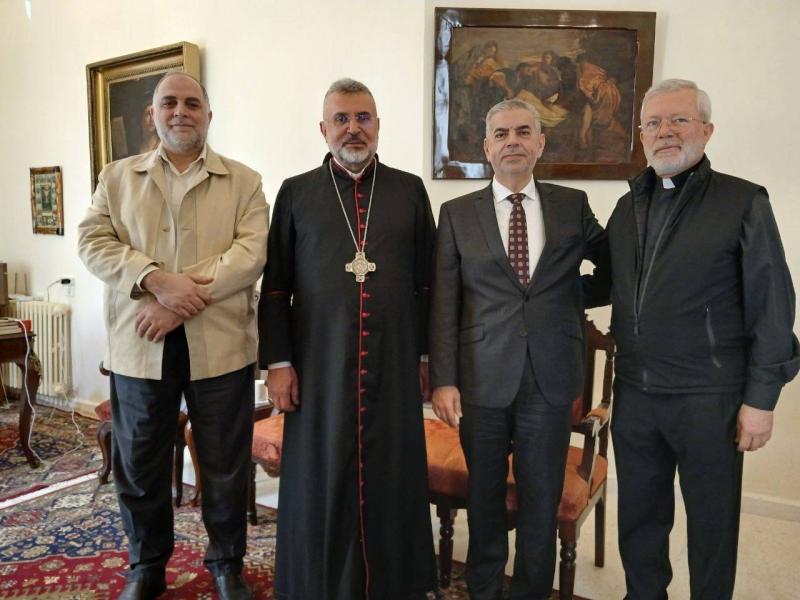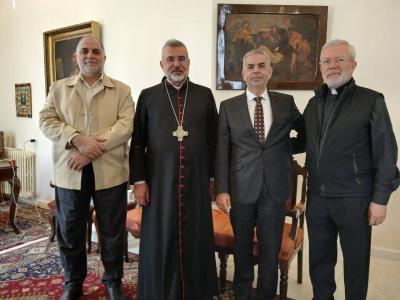The Maronite Archbishop of Tripoli, Bishop Joseph Swaif, received Dr. Kifah Al-Kassar, a member of the Higher Islamic Sharia Council, and Ahmed Al-Ayyubi, president of the Lebanese Foundation for Media and Development, at the bishopric in Tripoli. The meeting served as an opportunity to discuss the targeting faced by national life and Christian-Muslim partnership with the intent to dismantle it and to remove noble religious values from influencing social and political behavior within public opinion.
There was an agreement on the importance of cooperation and solidarity to fortify this partnership and promote its status against the calls for hatred and division intended to dismantle national unity. Bishop Swaif welcomed Al-Kassar and Al-Ayyubi and reviewed aspects of the distinguished relationships between the people of Tripoli and the North, considering them a treasure of unity and recovery for Lebanon due to their depth, historicity, and symbolism, as well as their continuity in the spirit of their citizens, who have always risen above attempts at division and have been steadfast guardians of national unity.
Dr. Al-Kassar called for a mobilization of national awareness in the face of waves of sedition, misinformation, and division among Lebanese, with initiatives to confront the ugly pollution that public opinion has been subjected to in recent days. He emphasized that it is unacceptable to leave the field to the demons of division and the horns of evil that seek to tear the nation apart and disrupt its stability by targeting the foundation of the nation, which is represented by the Christian-Muslim partnership.
Al-Kassar spoke about the necessity of cooperation among religious authorities and the active forces in society, aiming for a collective initiative that removes the impurities and mines left by mischievous elements to divide the people along sectarian, confessional, and regional lines. He stressed the importance of confronting phenomena that threaten civil peace and impact the unity of the Lebanese people, both as a nation and entity, through coordinated efforts that restore balance and alignment in the national scene.
For his part, Al-Ayyubi asserted that the silent majority of good, religious, and national citizens should unite on a common word based on unity to protect religious and national constants and values, ensuring they are not infringed upon through continuous initiatives. This would begin with a civil-religious meeting that renews the pledge to uphold the nation and present the correct image of Tripoli to all of Lebanon, while establishing a permanent incubator for ongoing Muslim-Christian cooperation grounded in the protection of human rights and condemnation of all who violate them, regardless of their religion or country.
The members present emphasized the need to guarantee justice for the Palestinian people, as their cause is central to all issues in order to build lasting peace and find a just solution. They also condemned the attacks on Gaza and the killing of children and women, which obstruct the peace process not only in the region but worldwide. Regarding the situation in Lebanon, Bishop Swaif welcomed all collective initiatives, commending the ideas presented by Al-Kassar and Al-Ayyubi and announcing support for efforts to unify and promote humanitarian and national solidarity among the Lebanese.




